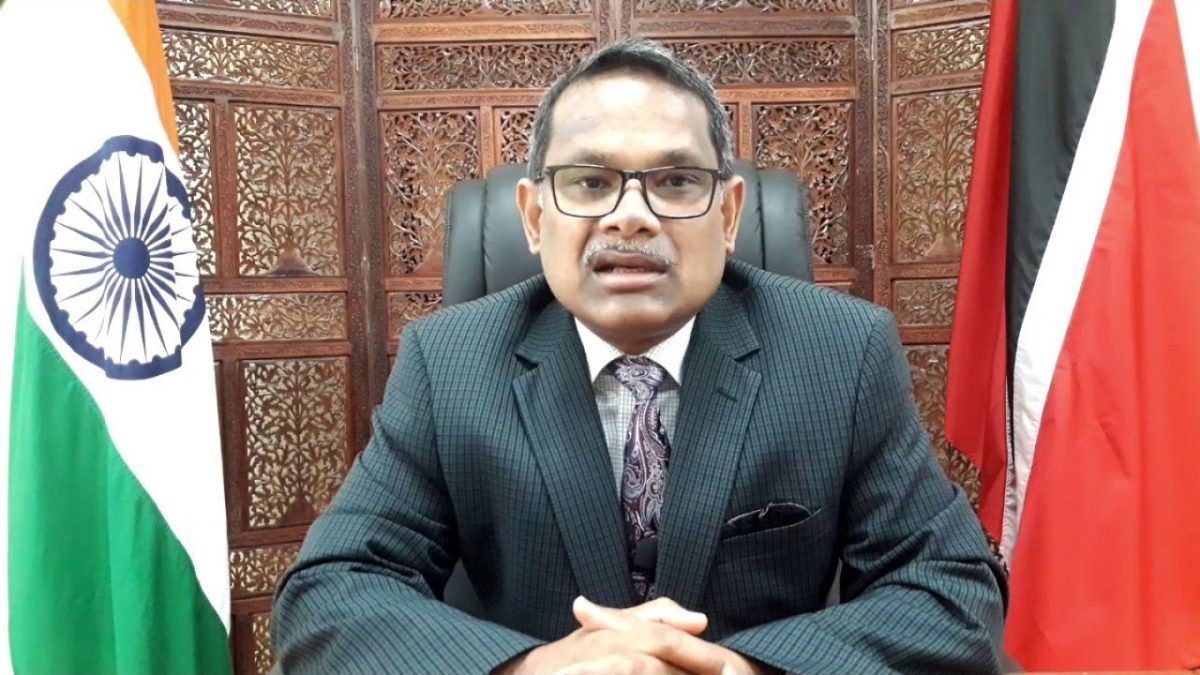(Trinidad Guardian) Indian High Commissioner Arun Kumar Sahu yesterday said efforts are being made to supply some vaccines to Trinidad and Tobago, however, there is no time frame for the delivery yet.
Sahu and the Government have been at odds over whether there was a 500,000 vaccine facility available to CARICOM and why T&T did not benefit from that possible availability.
On Thursday and Friday, Prime Minister Dr Keith Rowley said that there was no such offer of donated vaccines to this country and the facility did not exist.
He also described the current situation as “difficult” and said that it was Sahu who triggered the discord.
But in a media statement yesterday Sahu sought to clarify his role in this vaccine debacle.
He said he had “taken note of the controversy around India’s possible vaccine donation to Trini-dad and Tobago and the role of the High Commis-sioner in it” and the timeline from when Indian Prime Minister Narendra Modi announced the vaccine Maitri drive last year to when Dominican Prime Minister Roosevelt Skerritt requested donations through him to almost a month later when T&T made its request.
“In his Independence Day speech on 15th August 2020, Hon’ble Prime Minister of India, Mr Narendra Modi had said that India was ready to mass-produce COVID-19 vaccines when scientists give the go-ahead,” Sahu recalled.
Sahu said again on September 26, Modi again made reference to the global drive to share vaccines.
“Subsequently, both PM Modi and External Affairs Minister Dr S. Jaishankar, on multiple occasions, talked about the Vaccine Maitri initiative of India. Media, both Indian and international, reported extensively about this initiative, “ he said.
Sahu said what followed was requests from various heads of governments for the Indian-made vaccine.
“The government of India started the supply on 20th January 2021. To date, India has supplied Covid vaccines to 72 nations across geographies,” Sahu said.
He said that on January 19, 2021, Prime Minister of Commonwealth Domi-nica, Roosevelt Skerrit, wrote to PM Modi for a donation of vaccines.
“His letter and subsequent social media exchanges are in the public domain. The donation of AstraZeneca vaccines arrived in Dominica on 9th February 2021,” he said.
Dominica received some 70,000 vaccines from India.
The vaccines received World Health Organisation (WHO) approval on February 15 and Sahu said that on that day both Health Minister Terrence Deyalsingh and Foreign Minister Dr Amery Browne reached out to him separately to explore the possibility of getting AstraZeneca vaccines from India.
“To both, the High Com-missioner conveyed two clear options,” he said.
One option was that the T&T government could request from the Govern-ment of India a donation of vaccine, “for which a request at the highest level to PM Modi might be considered”.
The second option was that T&T could directly explore a commercial purchase of the vaccine from the Serum Institute of India (SII).
“Since it is a commercial deal, GOI (Govern-ment of India) will have a minimal role, only facilitating export approval,” he said.
“The relevant T&T authority could enter into a commercial agreement with SII. A copy of the deal could be shared with the High Commission so that we could help get expeditious export approval,” he said
Sahu said he made it clear that it will not be easy since there is a tremendous global demand.
He said that the next day, on February 16, he received Browne’s letter to his counterpart India’s External Affairs Minister Jaishankar requesting assistance in access for purchase and receipt of 250,000 doses of vaccine from SII.
Sahu said that by February 23 he was called to the Foreign Office for a quick meeting. He said he was then informed that SII was not taking any commercial order at that time.
“And his assistance was sought in getting some vaccine donation,” he said.
Sahu said that even though it was “very late, T&T may like to make a request for a donation at a suitable level”.
The High Commissioner said that he “also conveyed that given the history between the two countries, he would make an extra effort to get the vaccines and was told that “a letter would be sent”.
The High Commissioner did not say whether such a letter was sent.






